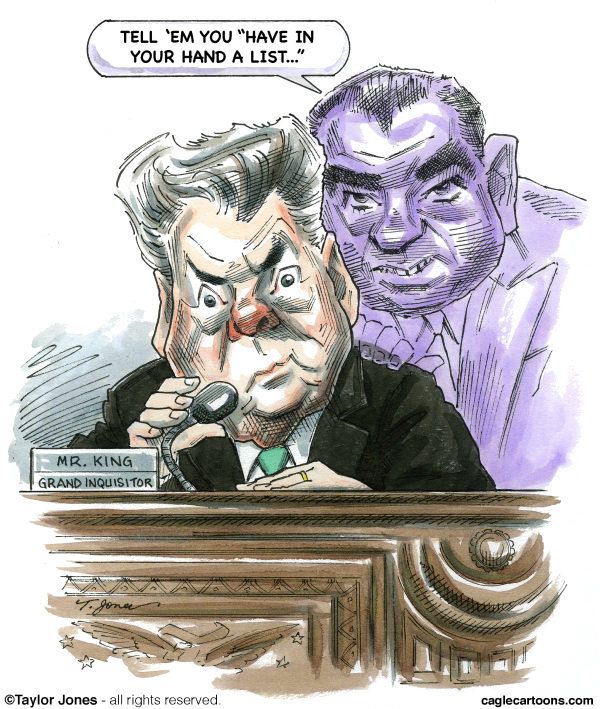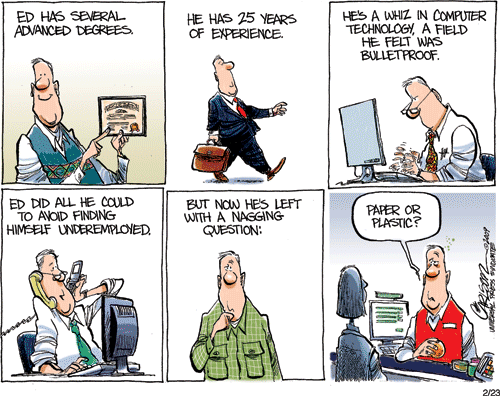Even before the ink was dry on the continuing resolution that will keep the US government open until March 18, President Obama was already caving to Republican demands:
The White House has released what amounts to an opening bid in budget negotiations for Fiscal Year 2011 with Republicans. They have offered an additional $6.5 billion in cuts below the baseline of the 2010 budget. This goes on top of the $4 billion in cuts that have already been signed into law….this briefing took place before the first meeting between the White House and Congress even began. So the compromises preceded the negotiation. And there are no compromises happening on the other side.
That was Friday. Then on Saturday in his weekly address to the country via You Tube, he not only confirmed this but stated he was willing to go further.
How much further is he willing to sell out the middle class, the poor and future generations? Well this weekend he sent our one of his “canaries” to test the “air”, Austin Goolsbee, who in appearance on Lawrence O’Donnell’s “Last Word” couldn’t answer a straight question about Social Security.
From Gaius Publius at AMERICAblog points out the worst of Goolsbee’s administration apologia:
The Goolsbee interview starts at 3:20; the Social Security discussion starts at 7:15. At 8:80, weasel words begin leaving Goolsbee’s mouth – and they just don’t stop
Kudos to O’Donnell (who’s a benefit hawk himself) for pressing this hard. Question: Are you open to small changes to Social Security benefits, changes that would not be called “slashing”?
Goolsbee: “We don’t have a specific plan” … we want an “open discussion” … the president won’t weaken Social Security “including especially ideas about privatization” … but he “will look at” things that “insure the solvency” of the program. Weasel. They still want at it.
And by “they” I mean Obama. The Bush tax cuts blow a hole, and Social Security benefits are the fix. Dems, Reps, doesn’t seem to matter.
Senate Majority Leader, Harry Reid (D-NV), to his credit, very clearly and concisely stated on Meat the Press in January that Social Security did not contribute to the deficit or the current budget problems:
DAVID GREGORY: Social Security– how does it have to change? (an assumption by Gregory, TMC) What they put on the agenda is raising the retirement age, maybe means testing benefits. Is it time for Social Security to fundamentally change if you’re gonna deal with the debt problem?
HARRY REID: One of the things that always troubles me is when we start talking about the debt, the first thing people do is run to Social Security. Social Security is a program that works. And it’s going to be– it’s fully funded for the next forty years. Stop picking on Social Security. There’re a lotta places–
DAVID GREGORY: Senator are you really saying —
HARRY REID: –where you can go to save money.
DAVID GREGORY:– the arithmetic on Social Security works?
HARRY REID: I’m saying the arithmetic in Social Security works. I have no doubt it does.
DAVID GREGORY: It’s not in crisis?
HARRY REID: The ne– no, it’s not in crisis. This is– this is– this is something that’s perpetuated by people who don’t like government. Social Security is fine. Are there things we can do to improve Social Security? Of course.
Why is Obama even bothering to say he’s willing to “negotiate” when we all know the real word is “cave”?


 One of the regulation under the Dodd-Frank bill that was passed by Congress was regulating the
One of the regulation under the Dodd-Frank bill that was passed by Congress was regulating the  No doubt the Obama administration will tout today’s news that unemployment has fallen .4% to 9.0% as an indication the US economy is improving. It will be quite a back aching twist of logic in the face of poor job growth of only 36,000 jobs in January far below expectations. So what’s really happening?
No doubt the Obama administration will tout today’s news that unemployment has fallen .4% to 9.0% as an indication the US economy is improving. It will be quite a back aching twist of logic in the face of poor job growth of only 36,000 jobs in January far below expectations. So what’s really happening?
Recent Comments